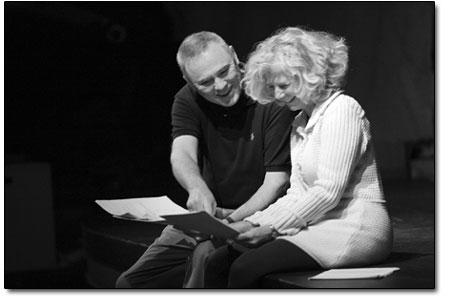|
| ||||
| 10 minutes on stage
by Stew Mosberg
Last October, the Durango Arts Center initiated a call for entries for its very own short-form play competition. The rules of all such contests require playwrights to submit pieces that take no longer than 10 minutes to perform, include no more than four actors and need only minimal props and costuming. In Durango, a team of local theater veterans was selected to read the submitted scripts under the supervision of Rochelle Mann, the former Dean of Arts, Humanities and Social Sciences at Fort Lewis College and the soon-to-be-interim Chairwoman of the Music Department. The idea of bringing a 10-minute play competition to Durango was conceived by Terry and Dinah Swan, both of whom are seasoned theater folk. DAC Board President Terry Swan is the former managing director of the New Stage Theatre in Jackson, Miss., and was the producer of DAC’s highly successful theatrical performance, “Always ... Patsy Cline.” Dinah Leavitt Swan is a playwright, actor, director and former professor of theater at Fort Lewis College. When the call for entries was first announced, it didn’t stop at Durango’s stage door but instead reached out to authors around the globe. Not knowing how many plays would come from our region, Mann contacted outside theater groups and arts organizations to ensure the greatest number of entries but never expected such a huge response. A total of 92 scripts arrived from as far away as Europe, Canada and New Zealand. Of those, seven came from local authors with two Durango scripts making it to the final round. Mann shared the surprise of both Terry and Dinah Swan when she remarked, “The number of entries far exceeded our expectations. We thought getting 50 would be amazing, but 92? That was a little overwhelming.”
After wading through almost 15 hours of scripted material, the judges gave the final nod to playwrights from California, Illinois, Mass-achusetts and New York. When asked why no local plays made the cut, Mann gave assurance that every script was read without any author identification and that those that made it into the closing round were unanimously chosen by the 15 jurors. In guiding the judging process, Mann said that other than needing to be an original work and not previously produced, there were no restrictions on content, theme, language, characters or effects. She told the panel to, “Judge them as they are, not as they could be with a good rewrite.” As administrator of the contest Mann knew she wouldn’t have a vote unless it would be to break a tie, which was never required. Maureen May, local artist and actress, was one of the judges who brought a valuable perspective to the selection procedure. “I totally loved the process,” she said, “and I read more than 30 of the submissions and thought at least 10 to 15 percent were really strong.” She further acknowledged that most of those she did get to read were well-written but judged them from the point of view of how she thought they would perform on stage. May admitted however, that most of the plays she herself liked didn’t make it into the final five. It is not surprising, that when she worked through the process of elimination, she considered the scripts from an actor’s perspective and found herself leaning toward comedies, albeit a good percentage of the entries were about grief and loss. Trying to explain the large amount of intense subject matter, Mann suggested that one criterion for 10-minute plays is that they should incorporate conflict and resolution; packing the emotional wallop of loss and grief into a few minutes of stage work can be one effective solution. The five finalists turned out to be; “Belonging,” by Laurence Klavan, of New York City; “Checkmate, Soulmate,” by Mad Hester, of Brooklyn; “Embodied Beings,” by Jeff Schwamberger, of La Honda, Calif.; “Grief,” by Lynne McMahon, of Chicago; and “Ronnie’s Charger,” by Lawrence Kessenich, of Watertown, Mass. The plays will be presented as dramatic readings this Sun., May 15, at 6 p.m. at the DAC Theatre. Terry Swan will be setting scenes and describing stage directions for the five scripts while the readings will be done by local artists and actors – Emily Eisele, Maureen May, Shay Lopez and Miles Batchelder. A $500 prize will go to the best of the best, and that script will be performed as a staged production in September during the DAC’s Showcase of the Arts. In addition to the grand prize winner, audience members at the upcoming readings will get to vote for their favorite and bestow a cash prize of $50 to that playwright. • For more information, contact the Durango Arts Center at 259-2606.
|



 Known as the “haiku of the American stage,” the concept of the 10-minute play was originally introduced by the Actors Theater of Louisville, Ky., in 1977. Since then, numerous competitions like it have become a challenge for playwrights everywhere.
Known as the “haiku of the American stage,” the concept of the 10-minute play was originally introduced by the Actors Theater of Louisville, Ky., in 1977. Since then, numerous competitions like it have become a challenge for playwrights everywhere.